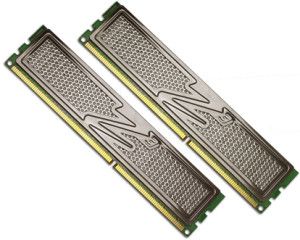From our front-page news:
It has been well over a year since NVIDIA first launched their EPP (Enhanced Memory Profiles) specification, but until now there hasn't been any real "competition". I put that in quotes, because it's not really a technology that has competition involved. However, NVIDIA's profiles only worked on NVIDIA-chipsets, naturally, so users of other Intel motherboard offerings were left in the dark, if they wanted that functionality.
Well thanks to a new OCZ press release, we find out that Intel will be releasing an EPP-like technology with their X38 chipset, called "Extreme Memory Profiles". It functions similarly to the way EPP did, by using spare bytes on the memory module's SPD to store enhanced profiles. In XMP's case, there are three profiles: Profile 0, Profile 1 and Profile 2. Profile 0 is JEDEC's standard, while Profile 1 is Intel's-preferred settings. Profile 2 will be up to the memory manufacturer to fill, in this case, OCZ.
<table align="center"><tbody><tr><td>
 </td></tr></tbody></table>
</td></tr></tbody></table>
That said, these modules will work in any computer, but XMP will only function when using an X38 motherboard. The stock settings for these particular modules is DDR3-1333 7-7-7, but Intel's special settings overclock them to DDR3-1600 8-8-8. OCZ further tweaks this setting by refining the timings to 7-6-6, although I am unsure at what voltage this is accomplished. EPP and the like have limited usefulness to enthusiast overclockers, but for those who don't want to dabble with overclocking at all but still want super-fast settings, XMP could prove to be quite a hit. We will have a review of these modules sometime next month, so stay tuned. Hit up the press release below for more info.
Sunnyvale, Calif. - September 10, 2007 - OCZ Technology Group, a worldwide leader in innovative, ultra-high performance and high reliability memory, today announced production of the industry’s first Intel Extreme Memory modules, a new memory solution that implements a high-performance specification optimized and predefined for the impending Intel X38 chipset.
Source: OCZ Press Release
Well thanks to a new OCZ press release, we find out that Intel will be releasing an EPP-like technology with their X38 chipset, called "Extreme Memory Profiles". It functions similarly to the way EPP did, by using spare bytes on the memory module's SPD to store enhanced profiles. In XMP's case, there are three profiles: Profile 0, Profile 1 and Profile 2. Profile 0 is JEDEC's standard, while Profile 1 is Intel's-preferred settings. Profile 2 will be up to the memory manufacturer to fill, in this case, OCZ.
<table align="center"><tbody><tr><td>

That said, these modules will work in any computer, but XMP will only function when using an X38 motherboard. The stock settings for these particular modules is DDR3-1333 7-7-7, but Intel's special settings overclock them to DDR3-1600 8-8-8. OCZ further tweaks this setting by refining the timings to 7-6-6, although I am unsure at what voltage this is accomplished. EPP and the like have limited usefulness to enthusiast overclockers, but for those who don't want to dabble with overclocking at all but still want super-fast settings, XMP could prove to be quite a hit. We will have a review of these modules sometime next month, so stay tuned. Hit up the press release below for more info.
Sunnyvale, Calif. - September 10, 2007 - OCZ Technology Group, a worldwide leader in innovative, ultra-high performance and high reliability memory, today announced production of the industry’s first Intel Extreme Memory modules, a new memory solution that implements a high-performance specification optimized and predefined for the impending Intel X38 chipset.
Source: OCZ Press Release
